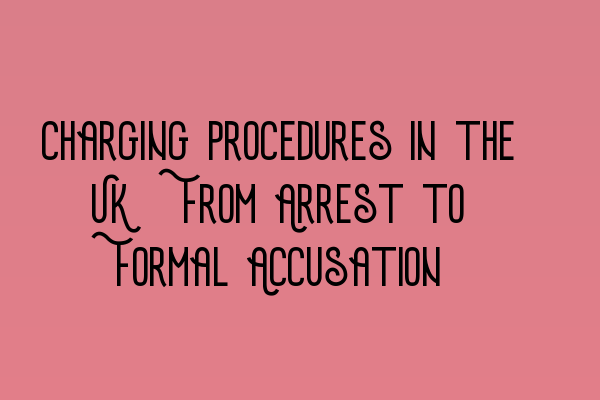Charging Procedures in the UK: From Arrest to Formal Accusation
Welcome to SQE Criminal Law & Practice Law UK! In this blog post, we will explore the charging procedures in the UK, from the moment of arrest to the formal accusation. Understanding this process is crucial for anyone involved in the criminal justice system, whether you are a solicitor, a defendant, or simply interested in the law.
The Arrest Process
When a person is suspected of committing a crime, the first step is usually their arrest. This can be done by a police officer with reasonable grounds for suspicion. Once arrested, the individual is taken into custody for further investigation.
Once in custody, the police have the power to question the arrested person, take their fingerprints, photographs, and DNA samples, and gather any other evidence that may be relevant to the case. This initial questioning process is crucial in building the case against the suspect.
The Charging Decision
After the arrest and initial questioning, the police will review the evidence they have gathered. They will evaluate the strength of the case and decide whether the suspect should be charged with a criminal offense. This decision is made in accordance with the Code for Crown Prosecutors, which provides guidance on whether there is enough evidence to prosecute.
If the police believe there is sufficient evidence, they will submit the case to the Crown Prosecution Service (CPS) for review. The CPS will then consider the evidence and determine whether there is a realistic prospect of conviction. They will also assess whether it is in the public interest to proceed with the prosecution.
If the CPS decides that there is enough evidence and it is in the public interest to prosecute, they will authorize the police to charge the suspect with a specific criminal offense. This formal accusation is a significant step in the criminal justice process, as it marks the transition from being a suspect to being a defendant.
The Court Process
Once the suspect has been charged, the case will proceed to court. The defendant will be informed of the charges against them and will have the opportunity to enter a plea. Depending on the nature of the offense and the defendant’s plea, the case will either be heard in the Magistrates’ Court or the Crown Court.
At the Magistrates’ Court, less serious offenses are dealt with, and a magistrate or a panel of magistrates will preside over the case. If the defendant pleads guilty, the court will proceed to sentencing. If the defendant pleads not guilty, the case will be set for trial.
SQE 1 Practice Mocks FLK1 FLK2
In the Crown Court, more serious offenses are tried, and the case is heard by a judge and a jury. The jury will assess the evidence presented and determine the defendant’s guilt or innocence. If found guilty, the judge will pass sentence.
Conclusion
Understanding the charging procedures in the UK is vital for navigating the criminal justice system. From the moment of arrest to the formal accusation and subsequent court process, each stage plays a crucial role in determining a person’s fate.
If you are pursuing a legal career in criminal law, it is essential to have a comprehensive understanding of these procedures. Enrolling in SQE 2 Preparation Courses can help you further develop your knowledge and skills in this field.
For those preparing for the SQE 1 exams, don’t forget to check out our SQE 1 Preparation Courses and take advantage of our SRA SQE Exam Dates.
Stay tuned for more informative articles from SQE Criminal Law & Practice Law UK!
